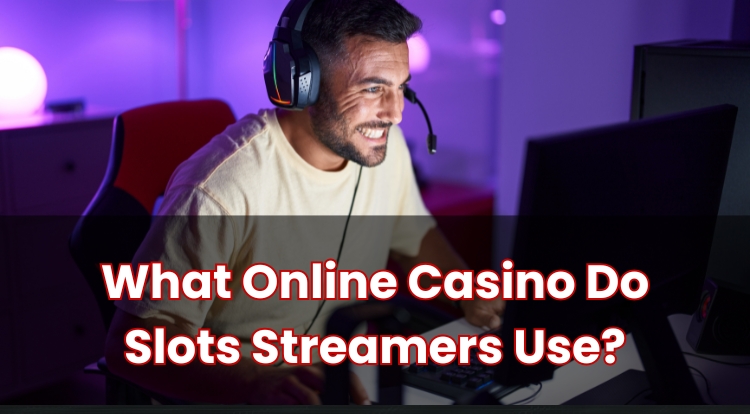Do Slot Streamers Use Real Money Or Are They Fake?
Online gambling has seen a rise in the popularity of slot streamers. These content creators livestream themselves interacting with online slot games, offering entertainment and, at times, surface-level observations about how different games operate. Their growing presence has prompted questions from viewers, particularly around one key issue: whether what appears on screen reflects genuine play or something else entirely.
This blog post takes a closer look at the reality behind slot streaming. It outlines what slot streamers do, introduces the idea that their income may come from several sources, and touches on why questions around authenticity continue to arise. It also highlights ways viewers might assess gambling content more critically.
Read on to learn more.
What Are Slot Streamers?

Slot streamers are individuals who broadcast themselves interacting with online slot games on platforms such as Twitch and YouTube. During these livestreams, they usually share their screen so viewers can see the game interface, the stake size if a spin is placed, and the outcome of each round. Most streamers also provide live commentary, reacting to results and responding to chat messages in real time.
Slot streaming combines gambling-themed content with online entertainment. For some viewers, the appeal is simply watching gameplay unfold, while others use streams to get a general sense of a slot title before deciding if they might choose to play it themselves at a later stage. At this point, it is not always clear to viewers how the streamer is funding the gameplay or what arrangements sit behind the broadcast.
Although some streamers explain features such as bonus rounds or paylines, this information is often introduced briefly rather than in depth. Slot streamers are content creators first, not advisers, and their broadcasts are designed to be engaging rather than instructional. Viewers should also be aware that watching slot streams may give a skewed impression of outcomes, as highlights naturally receive more attention than routine results.
How Do Online Slot Streamers Make Money?
Slot streamers usually earn income from several overlapping sources, rather than relying solely on the outcome of spins shown on screen. At a glance, these earnings may appear closely tied to gambling activity, but the underlying picture is more varied.
Common income sources include commercial partnerships, promotional links, platform features, and direct audience support. Each of these plays a different role in how a streamer sustains their channel, and not all of them depend on the streamer placing bets or winning during a stream. The details of these income streams, and how they work in practice, are explained more fully below:
- Sponsorship Deals: Some slot streamers have commercial relationships with online casinos or game developers. These arrangements generally involve promoting a specific platform or title in exchange for payment or other agreed benefits. In regulated markets, sponsorships usually require disclosure so viewers understand that a commercial agreement exists. Payments are often fixed and not tied to how the gameplay unfolds.
- Affiliate Marketing: Affiliate links are commonly used in gambling-related content. If a viewer clicks one of these links and registers with a casino, the streamer may receive a commission. This may be calculated in different ways, such as a share of generated revenue or a pre-agreed fee. This income is separate from any money used on screen and does not depend on the streamer winning or losing.
- Viewer Subscriptions and Donations: Streaming platforms allow viewers to support creators directly. Subscriptions and one-off donations are optional and are usually given because viewers like the content. Advertising revenue from the platform itself may also contribute, especially for larger channels. None of these sources requires viewers to place bets themselves.
Do Slot Streamers Use Real Money?
In some cases, slot streamers do use real money, though this is not always apparent at first glance. Many established streamers interact with live games using funds that behave in the same way as any other player’s balance, meaning outcomes are generated by standard game systems. This point is often mentioned briefly early in a stream, then clarified further as viewers ask questions.
At the same time, some online casinos may offer demo or practice modes that use credits with no monetary value. Streamers may use these modes to introduce a game or show features, and responsible creators will usually indicate this clearly. Confusion tends to arise only if demo play is presented in a way that suggests otherwise.
There have also been wider discussions within gambling media about situations where on-screen balances do not reflect personal financial exposure. While such cases are not representative of most creators, they contribute to viewer scepticism. Clear communication is, therefore, central to understanding whether gameplay reflects real stakes or not.
Are Slot Streamers Given Money By Casinos?
Sometimes, casinos provide streamers with funds specifically to be used on their platform. Early references to this may sound like the use of “fake” money, but the reality is more nuanced. These funds are often referred to as a streaming balance and are used to place real bets within the casino system.
The key distinction is that the streamer is not using their own personal funds. The gameplay itself is genuine, and any outcomes are produced under the same conditions as those faced by other players. Depending on the agreement, winnings may or may not be withdrawable. In regulated regions, these arrangements generally require disclosure so viewers are aware of the setup.
Not every streamer accepts this type of support, and not every casino offers it. Some creators prefer to use only their own money, while others rely on provided balances to produce regular content without personal financial pressure. Both approaches are permitted in many jurisdictions as long as advertising and gambling rules are followed.
How To Spot Fake Gambling Streamers
Although many slot streamers operate openly, viewers should still approach gambling content with care. Certain indicators may suggest that a stream might be misleading, especially if details are consistently vague.
- Check the Quality of the Casino: Reputable streamers usually work with licensed casinos that display regulatory information. Promoting poorly reviewed or unlicensed platforms, especially without explanation, may be a cause for concern.
- Watch for Unrealistic Presentation: Streams that focus almost entirely on big wins, without showing ordinary outcomes, may give a distorted impression of slot play. If you choose to play slots yourself, results typically vary widely, and frequent losses are part of that experience.
- Check for Disclosure and Transparency: Clear statements about sponsorships, affiliate links, or provided balances help viewers understand the context of the stream. A lack of disclosure, particularly alongside heavy promotion, might indicate that information is being withheld.
- Be Wary of Artificial Popularity: Inflated viewer numbers or engagement may be used to suggest credibility. While this issue exists across many content types, it may also appear in gambling-related streams.
Slot streaming is a varied form of online content with many different approaches behind the scenes. Some streamers use their own money, others use funds supplied through disclosed commercial arrangements, and some switch between live and demo play. Understanding these differences helps viewers better interpret what they see on screen.
If you choose to engage with gambling content, or if you later decide to play slots yourself, it is important to keep entertainment separate from personal decision-making. Slots are games of chance, and spending should always stay within personal limits.
Taking breaks, avoiding pressure to copy on-screen behaviour, and seeking independent information are all part of responsible gambling practices.
*All values (Bet Levels, Maximum Wins etc.) mentioned in relation to these slot games are subject to change at any time. Game features mentioned may not be available in some jurisdictions.





